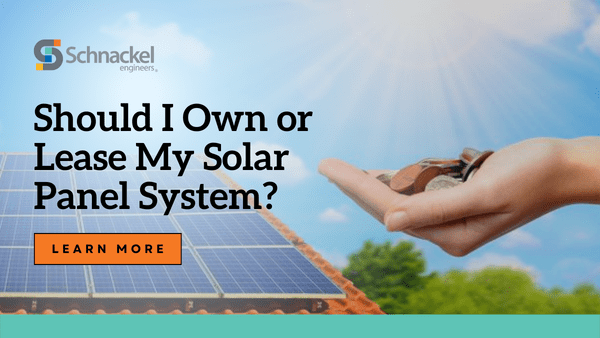Should I Own or Lease My Solar Panel System?

If you’re considering installing a solar panel system on your commercial property, you need to take into account a few things. One of the most critical factors is deciding whether to own or lease a solar system. Here’s a look at each option and what you need to know.
What Is The Difference Between Buying And Leasing a Solar Panel System?
Solar panel installation has become increasingly popular as building owners, and developers look for ways to reduce their energy costs. However, two approaches can be taken when installing solar panels: buying them outright or leasing them from a third-party provider. So what is the difference between these two options?
When you buy solar panels, you own the equipment and are responsible for its maintenance and repairs. This option is typically suitable for those who have the upfront capital to invest and are planning on staying in their current location for the long term. On the other hand, leasing solar panels involves renting the equipment from a third-party provider.
The provider typically takes care of the design, installation, maintenance, and repairs, and at the end of the lease term, you have the option to purchase the panels if you wish. This option is often more attractive to building owners who don’t have the upfront capital to invest or are planning on moving or selling their property soon.
There are pros and cons to both buying and leasing solar panels. Ultimately, your best option will depend on your specific situation and needs.
Leasing Options
When it comes to solar energy, building owners and developers have various leasing options to choose from. For example, a power purchase agreement (PPA) allows building owners to lease solar panels from a developer, who then sells the electricity generated back to the building owner at a fixed rate. This type of agreement is becoming increasingly popular in the commercial building industry, as it allows building owners to hedge against rising energy costs and take advantage of government incentives. Another option is direct lease, in which a developer leases solar panels directly to a building owner. This arrangement gives the building owner more control over the solar panel system but requires a more considerable up-front investment. Regardless of which option is chosen, solar leasing can be an excellent way for building owners and developers to reduce their energy costs and help the environment.
Pros of Leasing a Solar Panel System
Little Upfront Costs
Developers and building owners choose to lease solar panels because it requires little upfront costs. This can be a significant advantage for building owners who may not have the budget to cover the initial upfront costs themselves.
Third-Party Maintenance
Another reason leasing solar panels has become popular is that they offer third-party maintenance. Under a lease agreement, the solar panel provider is responsible for maintaining the equipment, saving building owners significant time and money.
Cons of Leasing a Solar Panel System
Leased Solar Panels Can Complicate A Real Estate Transaction
When building owners or developers want to sell or lease a commercial building, they must consider the solar panels installed on the property. Leased solar panels can complicate a real estate transaction because the lessee of the solar panel may have a contract with the building owner or developer that gives them the right to keep the solar panel installed on the property for a certain period.
This can make it difficult for the building owner or developer to negotiate terms with a potential buyer or tenant who does not want to lease the solar panel. In some cases, the building owner or developer may be able to sell or lease the property without the solar panel, but they may have to give up some profits to do so.
Ineligibility For Incentives And Rebates
One of the most significant drawbacks of leasing a solar system is that building owners may be ineligible for incentives and rebates available to those who purchase and install their panels. In addition, leasing arrangements often involve long-term contracts that can be difficult to break if you decide you no longer want the panels.
Pros of Owning a Solar Panel System
Federal and State Tax Credits
One of the significant benefits of owning solar panels is the eligibility for federal and state tax credits. In addition, many states offer incentives, such as rebates and property tax exemptions. As a result, solar panels can provide a significant financial benefit for commercial building owners. As discussed in our blog “Why Solar Now” the tax advantages of installing solar panel systems are greater than ever and have just been extended by the recently passed Inflation Reduction Act.
Cons of Owning a Solar Panel System
Upfront Costs
The high upfront costs of solar panel systems are often cited as a major drawback. For building owners and developers, the initial investment can be significant. However, the commercial building industry is becoming increasingly aware of the long-term benefits of solar energy, and many businesses are willing to make the upfront investment. In addition, government incentives can help offset the costs of solar panel systems, making them more affordable. With continued advancements in solar technology, the upfront cost of solar panel systems is expected to decrease, making them more accessible to a broader range of businesses and commercial developers.
Final Word
So, what’s the answer? Should you lease or buy your solar panel system outright? The answer is that it depends. Both options have pros and cons, and the best decision for you will depend on various factors unique to you. With the booming solar industry, weighing all your options when deciding whether to go solar is crucial. Owning a system may be the best option if you want to save money in the long run.
If you’re interested in installing a solar system on your property, consult with Schnackel Engineers today!
Comments